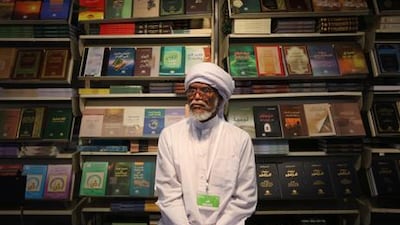The Sharjah Expo Centre's main hall is quiet until Dr Sheikh Sultan bin Mohammed Al Qasimi, the ruler, walks briskly through the space, accompanied by a group of 50 officials.
A tall, serious-faced man near the head of the entourage makes sweeping motions with his right hand in the direction of those of us who stand in the way as the delegation wends through the Sharjah International Book Fair. A young British man who is visiting the emirate for the first time watches Sharjah's ruler pass by. "He looked at me!" the man exclaims. "I think he approved of me."
Elsewhere, groups of uniformed schoolgirls stride through the Expo Centre's broad, carpeted halls. They push forward enthusiastically into book booths, vying to purchase sheets of stickers, waving their money at booth attendants.
Young men and women also make their way around the fair - the emirate's 29th - mingling with a large contingent of foreign publishers who have joined what could be best described as gentle chaos.
Curiously, the fair seems to stitch together a collection of separate interests - from the consumer-oriented business of selling stickers and Disney-themed notebooks to the serious side of a professional conference. Within this space, Arabic butts against English; events for children rub against those aimed at adults. Meanwhile, new media entities Twittercast live from Expo Centre while print reporters use a modest blue-carpeted press room to file stories on slow desktop computers about Dr Sheikh Sultan's opening speech or the winner of this year's Dh1 million Etisalat Prize for Arabic Children's Literature (this year it was The Black Dot, published by Egypt's Dar El Shorouk). Still more reporters sit on the room's couches, dissecting the aforementioned keynote address.
Hosam Mero, a poet and journalist, said that he had found it particularly moving that Dr Sheikh Sultan urged everyone to write. Mero seemed almost embarrassed by the assessment of the state of reading in the Arabic-speaking world, before unhappily repeating the story of how Dr Sheikh Sultan had visited the Frankfurt book festival where he found next to nothing in the Arabic section. Mero's colleague Othman Hossam echoed that sentiment: "Americans, British, French, Germans have a book. But in Arabic, no."
Undeterred by this relatively downbeat opening, the two journalists were looking forward to the first poetry event of the fair.
After the morning ceremonies, Dr Sheikh Sultan moved purposefully from one part of the festival to another. The large group that trailed along with him somehow managed not to collide with the roving schoolgirls. Some two hours into the festivities, Dr Sheikh Sultan arrived at the jubilant Dar El Shorouk booth, flush with the success of landing its prize earlier in the day,
Unsurprisingly, the head of its children's division, Amira Aboulmagd, was still bouncing on her heels, while the publishing head El Moallem happily gave the Sheikh a number of books, including Walid Taher's Etisalat-winning El-Noqta el-Sooda (The Black Dot), and Youssef Ziedan's Azazel, which won the International Prize for Arabic Fiction (IPAF), the Arabic Booker, in 2009.
Ziedan had just finished a cigarette and was walking back to the Dar El Shorouk booth during the start of the prize-giving ceremony. He moved through a phalanx of photographers to step forward and be introduced to Sharjah's ruler, who flipped through El Noqta El Sooda, but seemed well aware of Ziedan's Azazel and the controversy that has surrounded its author. In Egypt Ziedan has been a target of both Islamist and Christian groups. Two organisations filed lawsuits against him, mainly in reaction to his historical novel Azazel, which is set amid the theological disputes of the early Christian Church, but also in reaction to his public comments about religion.
Dr Sheikh Sultan gently chided Ziedan, but the chain-smoking Egyptian didn't shrink away in the face of criticism. He said that the book had been misconstrued and defended his literary speech. Dr Sheikh Sultan listened, and a few minutes later moved on to another stand with photographers, reporters and onlookers in tow.
An open-air cooking venue - new this year - found its first session notably under-attended. The first two rows were filled with women who actively questioned the international cooking guru Sally Bee, while the rest of the room was largely empty, although after a while a contingent of British publishers filled the back rows. Cooking exhibitions are scheduled to continue on afternoons throughout the fair, with perhaps more would-be chefs finding their way to the quasi-outdoor demonstration area.
No such problems for Dr Youssef Ziedan's short literary talk later that evening, which was one of the few places where it was difficult to find a seat. After Ziedan had concluded his speech, members of the audience stood up and gave their own brief presentations about politics and religion, some loudly disagreeing with his statements and shaking their heads at the Egyptian history professor.
Still, Ziedan continued to speak up for his vision of literature. And, although he had been chided by Dr Sheikh Sultan earlier in the day, the two men's messages echoed one another more than they disagreed: read, write and read again.
While Sharjah has a number of innovations this year - and a literary prize with a bigger purse than the IPAF - its 29th International Book Fair is still not quite the world attention-grabber it might be. Enthusiastic publishers are here in force though: international names like Octavia Nasr, the former CNN correspondent, and the Nobel Prize-winner JMG Le Clezio have brought their star power to bear. Yet this is nonetheless an event mainly for the region and most particularly for its amateur poets and for the enthusiastic children who filled the Expo Centre's halls earlier in the week.

